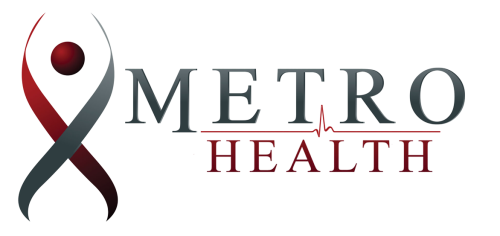The thyroid is a butterfly-shaped gland located in the neck, just above the collarbone in front of your windpipe. Though the thyroid is small, it plays a significant role in the body by producing hormones that help regulate breathing, cholesterol levels, heart rate, metabolism, muscle strength, and body temperature.
Since January is Thyroid Awareness month, now is the perfect time to learn more about this tiny but mighty gland that has a major impact on your health and wellbeing.
What is Thyroid Disease?
Thyroid disease is a general term used to describe a number of conditions that affect how the thyroid gland functions. Thyroid disease is diagnosed when the thyroid produces too much or too little of the hormones that play a role in many of the body’s systems (e.g., cardiovascular, digestive, immune).
Nearly 20 million Americans have some form of thyroid disease, and up to 60% of those individuals are unaware of their condition. Undiagnosed and untreated thyroid disease may lead to health complications, such as cardiovascular disease, infertility, and osteoporosis.
The most common types of thyroid disease are hyperthyroidism and hypothyroidism.
Hyperthyroidism
Hyperthyroidism, also known as overactive thyroid disease, occurs when the thyroid gland makes more thyroxine (thyroid hormone) than the body needs. There are several causes of hyperthyroidism, including:
- Grave’s disease. An autoimmune disorder that attacks the thyroid gland and causes it to grow and produce too much thyroid hormone.
- Thyroid nodules. Nodules (lumps) on the thyroid may grow and cause the thyroid to produce a higher amount of hormones.
- Thyroiditis. Temporary inflammation of the thyroid due to an infection or problem with the immune system. Inflammation can trigger the gland to leak stored thyroid hormones.
- High iodine levels. Consuming too much iodine through medications, supplements and/or seaweed, high iodine levels can cause the thyroid to make too much thyroid hormone.
Symptoms of hyperthyroidism include:
- Difficulty regulating body temperature
- Fatigue
- Frequent bowel movements
- Goiter (enlarged thyroid that makes the neck appear swollen)
- Mood swings
- Muscle weakness
- Rapid and/or irregular heart rate
- Sleep troubles
- Tremors (most often in the hands)
- Weight loss
Hypothyroidism
Hypothyroidism, also known as underactive thyroid disease, occurs when the thyroid gland doesn’t produce enough thyroid hormones to help the body function as it should.
A number of factors may lead to hypothyroidism, including:
- Autoimmune disease. When the immune system mistakes thyroid cells as invasive, it attacks the thyroid. When there aren’t enough thyroid cells and enzymes, the thyroid doesn’t make enough hormones.
- Congenital hypothyroidism.
- Pituitary gland damage. The pituitary is the “master” endocrine gland that signals to the thyroid how much hormone to make. If the pituitary is damaged, it may no longer send the thyroid its usual signals, causing a decline in hormone production.
- Radiation. Radiation used to treat certain conditions (e.g., Grave’s disease, lymphoma, thyroid cancer) can cause a decline in thyroid function.
- Medication. Certain medications (e.g., lithium) can interfere with thyroid hormone production. This is most likely to occur in individuals who have a genetic predisposition for autoimmune thyroid disease.
- Thyroiditis. Inflammation of the thyroid gland caused by a viral infection or autoimmune condition can trigger the thyroid to dump its entire supply of stored hormones into the blood at once, causing temporary hyperthyroidism, which then causes the thyroid to become underactive.
- Surgical thyroid removal. Removing all or part of the thyroid surgically can cause the thyroid to reduce or completely stop producing hormones.
Symptoms of hypothyroidism include:
- Constipation
- Depression
- Difficulty regulating body temperature and/or tolerating cold
- Dry skin and hair
- Fatigue
- Infertility (in women)
- Irregular or heavy menstrual cycles
- Joint and muscle pain
- Puffy face
- Slowed heart rate
- Weight gain
Treatments for thyroid disease
If you’ve been diagnosed with thyroid disease, your doctor will likely prescribe medications to help balance thyroid hormone production and return your levels to within the normal range.
There are a wide variety of thyroid medications available, and the type you are prescribed will depend on your specific condition.
If you have hyperthyroidism (overactive thyroid), treatment options include:
- Antithyroid drugs. Medications to slow the production of thyroid hormones.
- Radioactive iodine. This treatment damages thyroid cells to reduce high levels of thyroid hormone production.
- Beta blockers. Medications that do not affect thyroid hormone levels, but help manage symptoms.
- Surgery. Known as a thyroidectomy, surgical removal of the thyroid stops excessive thyroid hormone production, but you will need to be on thyroid replacement hormones for life.
If you have hypothyroidism (underactive thyroid), the primary treatment option is thyroid replacement medication (e.g., levothyroxine) to help keep thyroid hormones balanced at healthy levels.
What to do if you have symptoms of thyroid disease
Being proactive by staying aware of your body and noticing any changes that may indicate a problem with your thyroid and hormone production is important. Knowing the signs and symptoms of thyroid disease can help you get an early diagnosis and treatment to lower the risk of developing health complications.
Speak with your doctor if you suspect you have a thyroid hormone imbalance. They may suggest thyroid testing to provide an accurate diagnosis and begin appropriate treatment.

